#Zagatha
Explore tagged Tumblr posts
Text
Airplum : privilégiez le confort de ses ballerines à bride ZAGATHA
Pour le confort des personnes âgées, Airplum propose les ballerines à bride réglable ZAGATHA marine. Disponibles en plusieurs pointures, ces chaussures pour femmes ont un intérieur en éponge pour garder les pieds au chaud en hiver.

0 notes
Text



Y'ALL
Claes Bang literally said : I hope its not the end!... but also because I want to see how Steven and Mark will bring him and ( I REPEAT AND ) Agatha back to life
Yesssss people Yesss

#claes bang#dracula2020#count dracula#dracula#agatha van helsing#sister agatha#zoe van helsing#Zagatha#dolly wells
176 notes
·
View notes
Photo
Oh, very interesting, @ebaeschnbliah and @possiblyimbiassed!
One of the things that struck me about BBC Dracula is that Agatha is more engaging - more alive - than Zoe. But, as Dracula notes, Zoe is not only dying, she also sets herself apart; is loveless, totally devoted to her work and corrupted by her financiers. Perhaps a Moffatiss comment on what has been done to Sherlock Holmes' character over a century through so many adaptations.
In any case, as you point out, @ebaeschnbliah , connecting with Agatha through Dracula's blood unites the integrity and joy of Agatha with the independent agency and knowledge of Zoe: A whole person who now has the capacity to truly be her own self.









Welcome to England! … Count Dracula will send you a driver ….. and the first thing Sherlock notices about the passenger are … his TEETH!
Impressions from Dracula BBC & Sherlock BBC, The Dark Compass & A Study in Pink
@gosherlocked @raggedyblue @possiblyimbiassed @sherlockshadow @loveismyrevolution @shylockgnomes
125 notes
·
View notes
Photo
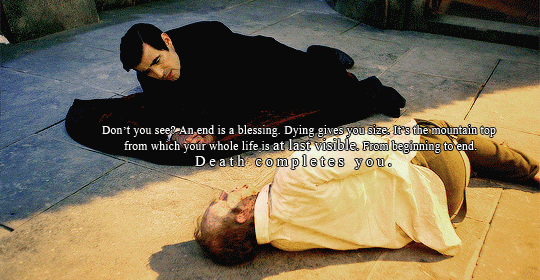

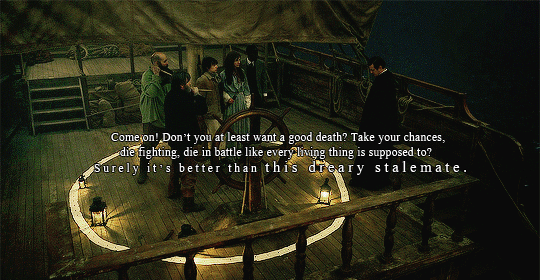
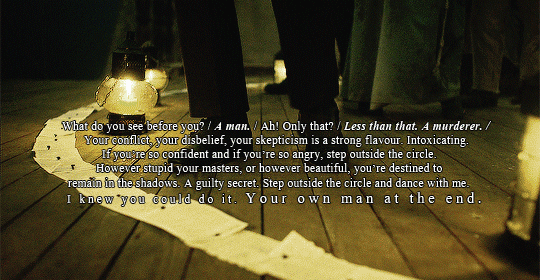
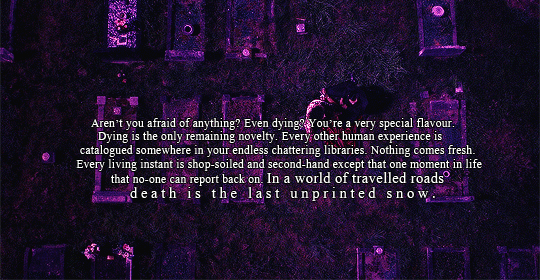
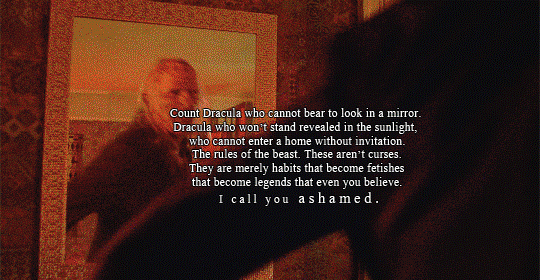
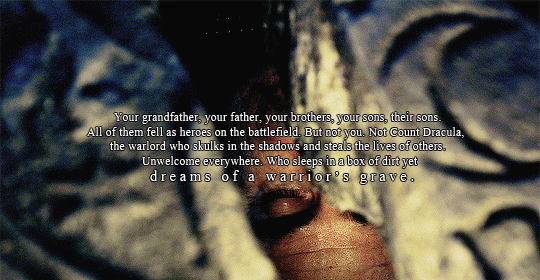
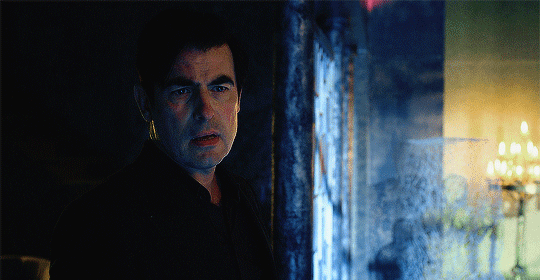
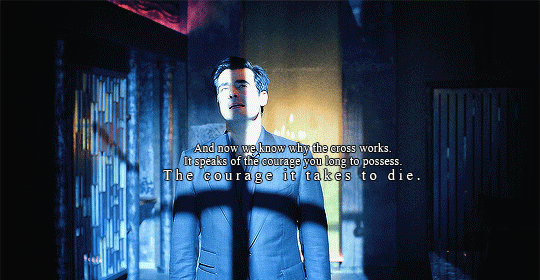

“I want something to eat, a bit of company. || I do sometimes wonder what it is that you actually want.”
The way Claes plays Dracula throughout -- including as an old man -- is that immense power is done as presumption. And the presumption come across as, “I don’t have to take you seriously. I can swat you like a fly anytime I like but for now, you‘re amusing me so let’s just carry on chatting.” And then at a certain point he doesn’t care anymore and just goes, “F**k it.” He’s just not bothering [with pretenses] anymore. That flippancy becomes menacing and sadistic. It’s a demonstration that he really doesn’t regard anybody as a threat. That’s quite difficult to deal with. And if he’s gonna kill you, he’d quite like to have a nice chat with you first. And when that’s done, he’ll snap your neck.
Dracula likes the Duchess. We had to cut it for time but there was a lovely bit where he says he couldn’t bear the idea of her going to England and living on benefits or some such. He didn’t like that idea, he was offended by it. It is sort of sentimental but it doesn’t mean he is kind. He is sentimental in the sense that, as we find out, he has met her before when she was 18 and he killed her mother. And then he finds her again and gives her a good death -- he joins those two things up. To him, in a way, it’s like “Oh, I remember that, it was last week.” but in the intervening time she’s aged 70 years. But he takes her for one last dance. She wouldn’t necessarily agree that’s a good death but in his point of view, there are all these little mayflies around him clinging to their pointless lives far past their value: “What difference does it make if I kill you today or tomorrow. You die anyway.” He has genuine affection and appreciation for all her memories and the life she’s led. So he enjoys her company and then drinks her blood.
At some level, he feels condemned to life but he does attempt to entertain himself all the time and he’s capable of valuing entertainment. For instance, he never just jumps Agatha. At any point. He never does. He could just grab her but he’d rather have a chat first. He seizes any moment of stimulation and interest and excitement. But there are some sort of Groundhog Day things going on. Early stages we talked about, just as a sort of backstory, that maybe Dracula spent a century being good just to see what it’s like. Maybe – because he talks to Harker about it – he tried suicide but it doesn’t work. Maybe he absolutely reached the end thinking, “I can’t do this anymore.” but “oh God, I can’t die.” And then you make the decision to go on but then that must be fueled by something different: “I need more of me.” And then it becomes an obsession, it becomes a mission, and over centuries you forget where you came from. And so you forget that actually the sunlight is fine. It all becomes an armour of shame.
Dracula is obsessed with survival. Lucy is nihilistic. That’s a flavor he’s never really tasted before and he sort of envies the ability to be okay with death, which he isn’t. He certainly finds that flavor seductive but he wasn’t necessarily working out why. It’s Zoe/Agatha -- “Zagatha” as we call her -- who figures out the connection that binds all this together: he knows he is a warlord who’s afraid to die. And that means he is trying to hide from himself. He lives like a scuttling rat. He wouldn’t stand in the sunlight. He wouldn’t look himself in the mirror. He wants to be invited in, he does not wish to be despised. All those dreadful things he’s built around himself that aren’t even true -- they are just in him. These rules and habits become fetishes. He’s forgotten himself and what [the rules are] all about. And in a way, we tried to give this a solution.
Fear of the cross was such a technical one. Dracula knows he is debasing himself to avoid death and there is the symbol of “die for your beliefs” and he can’t. He finds it hard to look at. He watched his own sons die in battle and he couldn’t. It’s a very powerful idea, what that might do to you. This mighty man, this amazing warlord defeated the Turk and did all these amazing things but he got this curse, this contagion, and the only thing he couldn’t do was to die a proper death. He just talks the talk. This is Agatha’s revelation while she is dying herself. He wants to have the courage to die. “Zagatha” says, “You want to defeat death but the only way to defeat death is to face it without fear.” Now that’s unfortunate. The only way to defeat death is to actually die. And that’s what he does at the end. He gets his act together, he goes into battle and he dies.
We were very happy with that as an ending. Dracula is a very hard character to kill but he certainly found a resolution, let’s put it that way. It felt very moving when he was lying across “Zagatha” on the table, drinking her blood. There was a sort of full-stop-ness to “You didn’t think I’d let it hurt, did you?” It was such an iron process of not revealing that that story is happening. I think everyone who watches goes, “Hang on. Those two. Those two, there is something weird there.” But it’s not acknowledged, really, until the very end. And indeed when he says it, “After all this time, did you think I’d let it hurt?”, you know. Of course he wouldn’t. So it’s rather sweet. I like it. He finally does actually bend a little. Claes does a lovely delivery on the line “You’re in pain.” And she says, “I’m equal to it.” But she doesn’t notice that what he says is, “You’re in pain.” He’s aware of somebody else’s pain for the first time as a bad idea. And being aware of somebody else’s pain is surely the gateway drug to morality. It’s not morality itself but it’s just the beginning of “somebody else suffering? I don’t like it. At least I don’t like that person suffering.” We liked that. We are sentimental. Love can redeem anyone.
--- Dracula commentary by Mark Gatiss & Steven Moffat [x] [x] [x]
#bbc dracula#long post#claes bang#dolly wells#mark gatiss#steven moffat#dracula x agatha#mine#okay but i love this? internalized shame & crippling self-hatred splintering into various myths over centuries#w/ dracula being their most steadfast believer#hiding in plain sight#punishing himself to the point of devolving into an amoral predator that can keep going regardless of what it takes to sustain itself#and how it's threaded through all 3 parts#briefly reflected in his conversations w/ others#and culminating in that final confrontation#breaking the 'dreary stalemate' of wanting to part but being afraid to take the leap#where agatha reminds him of his beginnings to usher in the end#which fittingly transitions into a dream#a dream he shares w/ her#'at last visible. from beginning to end'#*full chef's kiss*
157 notes
·
View notes
Text
SM: We're very happy with that as an ending. It felt very moving, when he’s lying across Zagatha on the table drinking her blood, we're saying, oh blimey, that's actually rather moving.
MG: We got rather moved writing it, there's a moment, there’s a rather full-stopness to it: "You don't think I'd let it hurt, did you?" We sort of looked at each other like, that's rather nice, that's rather touching.
SM: It was such an iron process of not revealing that that story is happening. I think everyone who watches it goes, hang on, those two, those two. There’s something weird there. But it's not acknowledged really until the very end. And indeed, when he says it: "You didn't think I'd let it hurt, did you?" Of course, of course he wouldn't. So it's rather sweet. I like it. I'm moved by it.
MG: Finally he does actually bend a little.
SM: I was thinking about it, it’s partly because -- Claes does a lovely delivery on the line: "You're in pain," and she says, "I'm equal to it." But she doesn't notice what he says -- "you're in pain" -- he's aware of somebody else's pain for the first time. That's a bad idea. Being aware of somebody else's pain is surely the gateway drug to morality. It's not morality itself, but it's just the beginning of, i could be -- somebody else suffering? I don't like it! Or at least, I don't like that person suffering. So that's-- we liked that, we liked that. Ah, we're sentimental.
MG: Oh, terribly.
SM: Love can redeem anyone.
(x)
88 notes
·
View notes
Photo





“You can’t hang me!” “Give me one reason not to.” “Because, because… I’m a vampire!”
4K notes
·
View notes
Text
The Lost Special?
Musings over possible implications of BBC Dracula
After obsessively watching all three episodes of BBC Dracula, I can’t help feeling I’ve got one of my suspicions, if not exactly confirmed, at least enhanced: that this Victorian old story, finally adapted into present time, might in fact be relevant to Mofftiss’ version of ACD’s short story The Lost Special. Maybe it is, maybe it isn’t, but since I can’t deny I do like ‘tin-hatting’, for now I choose to believe it is. ;)
(Continued under the cut)
As some of you guys already have expressed, I think BBC Dracula has BBC Sherlock written all over it. I believe this was obvious already from the setup; same authors, same producers, same broadcasters, same set designer, same format, three of the same actors including one of the writers, and even the same airing slot as BBC Sherlock. The Sherlock hints are sprinkled all over the two first episodes, which occur in the same Victorian time frame as ACD’s original Sherlock Holmes stories. This for example:
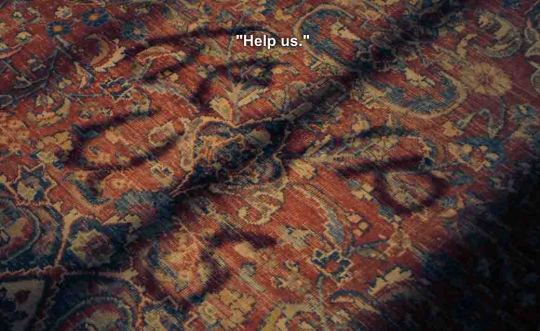
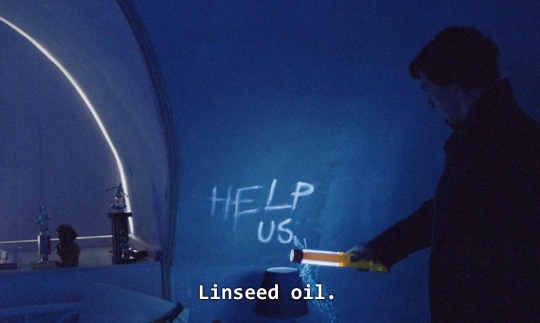
But the bringing of Bram Stoker’s old narrative into present time in the third episode (The Dark Compass) kind of sealed the deal for me.
Suddenly we have Count Dracula sending text messages by smart phone to his victims:
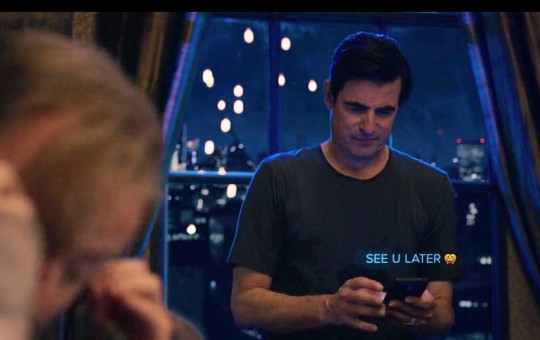
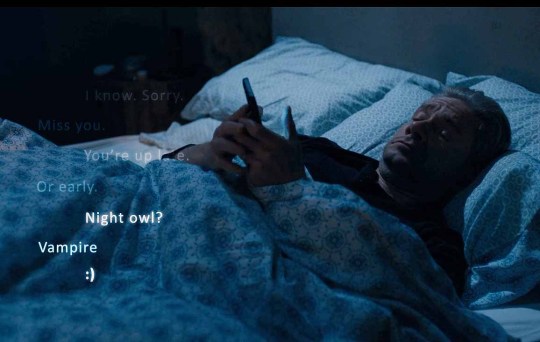
We have Dracula vomiting on the rug of a crime scene:

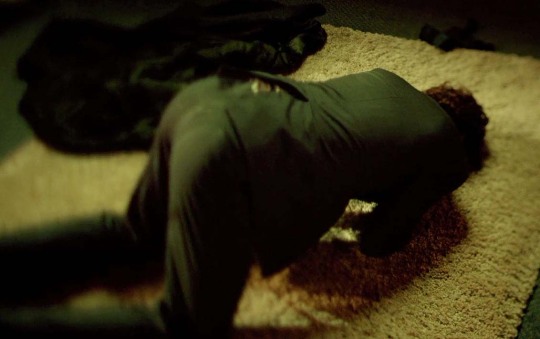
We have him storing body parts in the fridge! (X)
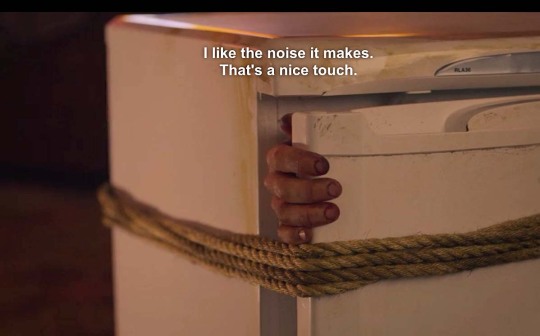
And this fridge scene is taking place while Dracula is watching a TV program with elephants on the Savannah, exclaiming “Look at her - so beautiful!”:

Who is beautiful - the ‘Elephant in the Room’? It certainly feels like Mofftiss are stringing us along here, doesn’t it? ;)) But no; it’s the sun that Dracula admires as beautiful, we learn that in the show. The shining from the sun is a thing he thought he could never endure, but ultimately he learns that he actually can.
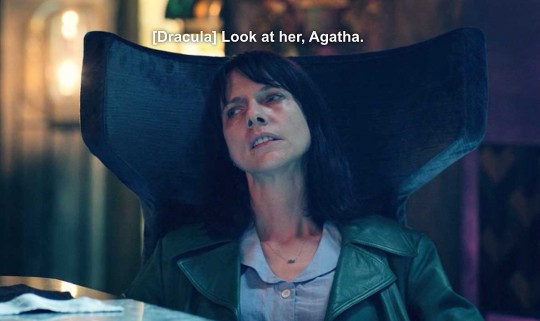
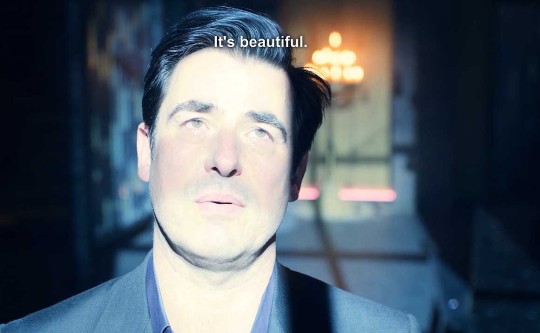
Same thing as Sherlock says about John Watson the distant suns in the sky in TGG:
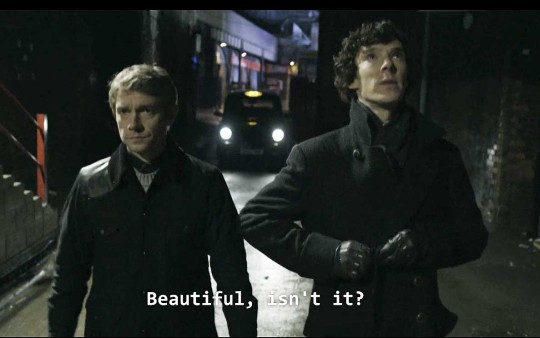
Or about Sister Sentiment’s music in TFP:
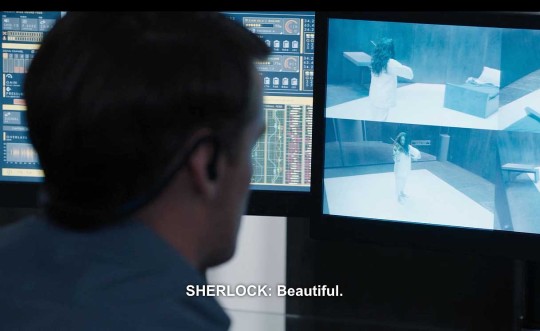
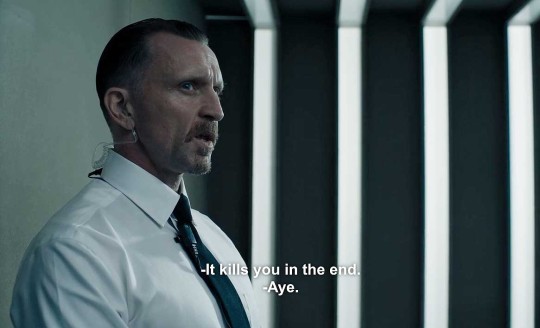
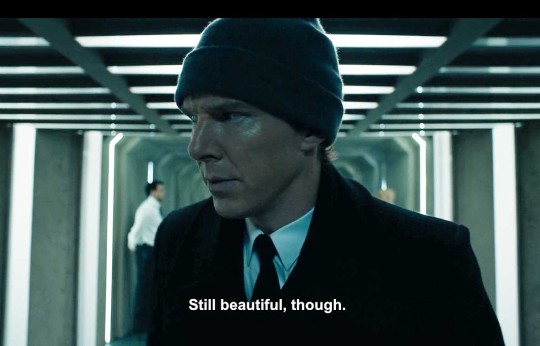
Taking Dracula to modern time is something that the authors had expressly denied they would do. But they were lying of course, as is their usual MO. Exactly the same deception as they did with TAB, isn’t it? And as if this wouldn’t be enough, there’s a whole list of other modern Sherlock references, summarized by @gosherlocked (X). I’m sure there’s more, we just need some more time to find them.
As I mentioned in this comment recently (X): The Lost Special (X) is a short story about a derailed, disappeared train that ACD wrote during the Great Hiatus (1898). It bears some typical Holmes-case mystery characteristics. And the anonymous person who in this story sends a letter to the train company, suggesting a way of solving the case, seems very much to be Holmes himself:
“It is one of the elementary principles of practical reasoning, that when the impossible has been eliminated the residuum, HOWEVER IMPROBABLE, must contain the truth. It is certain that the train left Kenyon Junction. It is certain that it did not reach Barton Moss. It is in the highest degree unlikely, but still possible, that it may have taken one of the seven available side lines. It is obviously impossible for a train to run where there are no rails, and, therefore, we may reduce our improbables to the three open lines, namely the Carnstock Iron Works, the Big Ben, and the Perseverance.”
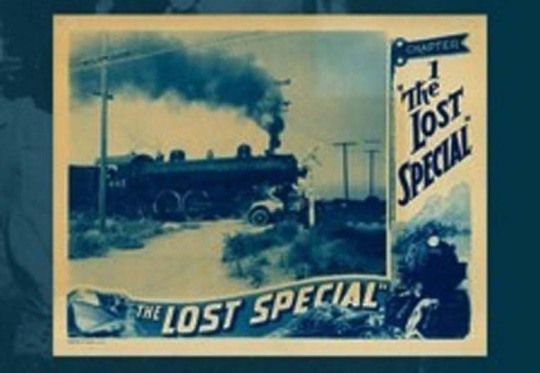
(X). So this short story indeed looks like a Holmes story in disguise. But Sherlock Holmes’ name is never mentioned in The Lost Special and the storyteller is not John Watson. In this story the police did not act on this anonymous person’s advice. The truth wasn’t revealed until one of the perpetrators - a hired murderer who was threatened with execution years later - admitted that he had participated in derailing the train in question (X): “A conspiracy of men had temporarily re-attached the side track leading to the abandoned mine Heartsease just long enough for the train to go down to the mine, then pulled the tracks back up before they could be discovered.” To the broader audience, however - the Holmes readers - the character of Sherlock Holmes remained ‘dead’.
The wrapping up
One could say that The Lost Special both had and had not a satisfactory ending. Satisfactory because the truth was finally told and the mystery thus solved, but unsatisfactory because in spite of all the hints, the readers didn’t get to know anything more from Holmes. Not until years later (1903) when ACD actually did ‘resurrect’ him and continued the narrative of Sherlock Holmes with 33 more short stories.
When Dracula finally ‘dies’ at the end of the BBC Dracula series, it’s not by being ‘staked’ or burnt to ashes with the sunlight as one would expect for a ‘monster’ like him. It’s by embracing the criticism of his most resilient but dying opponent: Zoe/Agatha Van Helsing (Mofftiss call her ‘Zagatha’ in an interview). She is dying from cancer, not from vampire bites. Dracula drinks her (to him) mortal blood and then ‘dies’ in her arms, basking in the sunlight (without burning) in a tender lovers’ embrace.
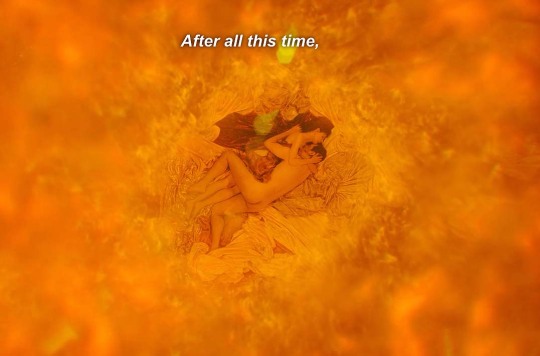
Zagatha in BBC Dracula is criticizing the vampire for skulking in the shadows, being afraid of facing death. She says it will be his punishment to live on for eternity, while she is mortal and dying:
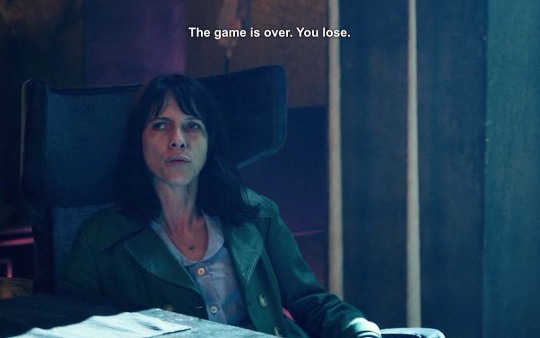
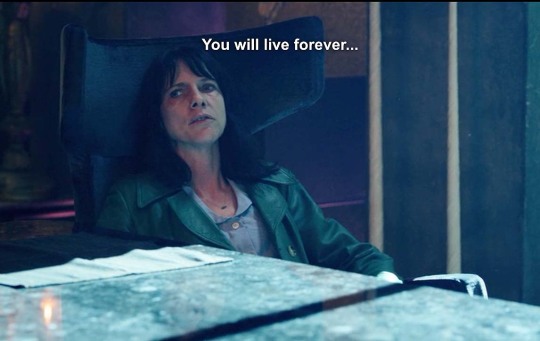
Seriously, this is so much ‘Buffy the Vampire Slayer that I can’t just... But Count Dracula re-writes Bram Stoker’s original story and opts for another solution: to ‘die’ willingly in the sunlight, together with Zagatha. And if dying is a metaphor for falling in love - as I believe it is in BBC Sherlock - this might have some important implications. I think Dracula and Zagatha here represent two sides of Sherlock that are finally allowed to merge; his Sentiment and his (Homo)sexuality.
Like The Lost Special, BBC Dracula is nicely wrapped up and ‘solved’. But we still don’t really know what happened with Count Dracula, because we don’t actually see him crumble into ashes like he did in Stoker’s canon, and like the other vampire who was ‘staked’ in the show - Lucy Westenra. But the episode is packed with Sherlock references, so...
But I can’t say for the life of me that S4 of BBC Sherlock brought a satisfactory ending for the Holmes narrative either; it’s not ‘wrapped up’ at all! John and Sherlock seem to live on for eternity as ‘best friends’, solving crimes in the heteronormative ‘legends’ preferred by Ghost!Mary’s voiceover. They are simply immortal, Un-Dead for ever - like a punishment? Wouldn’t it be far more satisfying if Sherlock Holmes and John Watson’s characters would come out and appear ‘human’ and ‘mortal’ and not have to remain just ‘best friends’ forever?
The (lack of) train references
One might argue, of course, that there are no specific train references in BBC Dracula, so how could we think it has anything to do with The Lost Special? Because, like The Lost Special, BBC Dracula is a Sherlock story in disguise! And because in the BBC Sherlock narrative itself there are already several episodes with train references; the most prominent of them is TEH and the last one - TFP. So there’s really no need for more references. But the train theme isn’t explained; it’s not ‘wrapped up’ at all, and neither is Sherlock’s story. I’ve tried to argue before that the detective is actually dying in S4, and so have others (X). And making him immortal will not save his credibility as a human.
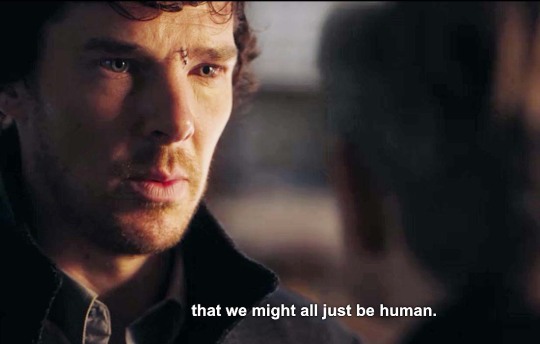
I do hope he’ll wake up again, though - preferably with help of modern medicine rather than superstition - to a more credible and realistic story than both TFP and Dracula. ;)
In TEH, apart from scenes with John Watson traveling alone through the Underground network of London, we have a derailed Underground train carriage near Sumatra road, where no-one would care to look. Like a Lost Special. It’s not carrying a bomb; the whole carriage is the bomb, which is threatening to overthrow the Parliament. Which very much makes me think that Mofftiss still have a metaphoric ‘bomb’ stored for us, a ‘rug-pull’ of sorts. But John and Sherlock (and the world) were not ready in TEH, so they switched it off. The ‘bomb’ never went off in S3 (2014). In TEH John was urging Sherlock to ”use your Mind Palace” to defuse the bomb, and I think he did - for the rest of the show up until TFP. Because in TEH, Instead of the big explosion, we got a truly weird, staged scene with Anderson (who didn’t quite believe Sherlock’s explanation anyway).
And then the plot carried on in its heteronormative tracks with John’s wedding and Mary taking over the narrative. But in TST we learned that Sherlock, as a child, had re-written an old tale about someone encountering Death in ‘Samarra’ into a story where the hero ends up in Sumatra instead, and lives. In TFP the plot derailed completely into an absurd horror story, and we got Moriarty as train driver, going “Choo-choo!” like a train whistle:
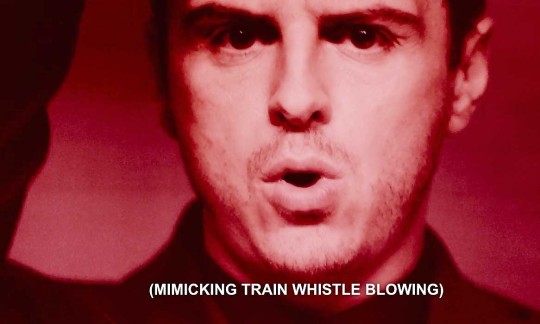
But the only 'explanation’ related to trains that we learn about Moriarty in TFP is rather lame: that Jim’s brother supposedly was a station master (not from canon, though). And then he goes “tick-tock, tick-tock” like a ticking bomb:
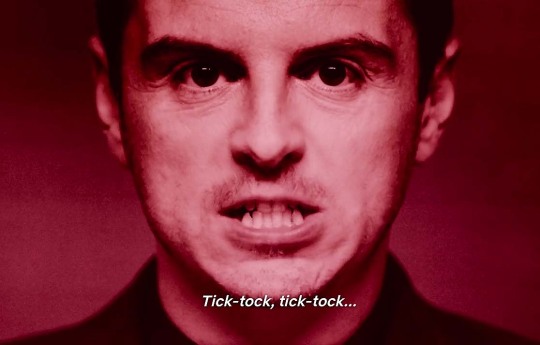
(Also similar to Mycroft’s ‘tick-tock’ countdown until he’ll die from obesity in TAB). But no bomb went off at that point in TFP either (I’m not counting the Patience Grenade here, because that happened before the ‘tick-tock’). So what was all that tick-tocking about? And how long will it keep ticking asdf?
The Sussex Vampire etc.
After reading some interesting metas from @yeah-oh-shit (X, X) and @ebaeschnbliah (X) I feel more and more convinced that legal issues with the ACD Estate might be very relevant for what Mofftiss are doing with BBC Sherlock and BBC Dracula. Three important ACD stories have now entered the public domain on January 1st this year: The Sussex Vampire (SUSS), The Illustrious Client (ILLU, where Holmes and Watson visit a turkish bath ;) ) and The Three Garridebs (3GAR; known for a scene where Holmes shows a glimpse of his true feelings for Watson). in SUSS there’s a quote about Sumatra which I find really interesting in the context described above:
“Matilda Briggs was not the name of a young woman, Watson,” said Holmes in a reminiscent voice. “It was a ship which is associated with the giant rat of Sumatra, a story for which the world is not yet prepared.
As I said in this comment (X), there’s a lot of subtext to draw from this. And I do hope the world is prepared now. ;)
@raggedyblue @ebaeschnbliah @gosherlocked
79 notes
·
View notes
Note
Hi! Your posts on BBC Dracula are wonderful. I still can't believe what they did with female characters in Dracula. So awful. Did anyone come out unscratched?
Hello!
You are welcome. As for female characters in Mofftissula (that’s the name for it, right?), you are right, it was pretty awful and no, no female character, more or less main, emerged unscratched out of this mess.
You see, in the novel, original novel by Bram Stoker, there was main female character who not only defeated, but also outlived Dracula and continued living, happily, after his destruction. This character was Mina. The novel was published in 1897.
BBC Dracula came out in 2020 - and all its more or less main female characters are dead by the end of the show. See for yourself:
Agatha Van Helsing, she is the main female character, this badass woman, who can stand up for herself, and be witty and clever and brave - but she dies. She dies back in XIX. Dracula meanwhile outexisted her and reached England in XXI and continued to kill and eat people quite happily there (until he realized at the eleventh hour that he had deep psychological problems, always wanted death, really, and offed himself).
Zoe Van Helsing, literal stand-in for Agatha in every shape and form (she is even called by Mofftiss “Zagatha” (yikes) by the end of the show). And she is already dying from cancer, and indeed dies at the very end of the show (both from cancer and because Dracula commits suicide by drinking her blood). Another goner.
Mina Murray. Since they moved the last part of the events to XXI century, by that time Mina is already dead. Dracula outexisted her. She never lived to see his destruction and never enjoyed living after that. Also as a character she was made to be totally redundant.
Lucy Westenra - the only canonical death, since Lucy also dies in the novel before Dracula. Yet somehow they managed to jack up her death and what came after it to disgusting proportions - she was made into incredible unlikeable character, where it was shown in every possible turn and way that her demise was her fault, and then she was extra punished by being burnt in her undead form so we got this walking incinerated abomination before she finally got staked by Jack (the only character who at least cared about her fate, cause others didn’t give a damn). People who were adapting her character in 2020 were more twisted and cruel to her than the guy who wrote her in 1897.
So you see, Mofftiss, actually made sure that in their Dracula “adaptation” NO female character, more or less main, came out alive and was allowed to outlive Dracula and, you know, have a good ending for herself.Let that sink.
40 notes
·
View notes
Text
A sister in Magnussen’s chair, again
I know it’s not exactly the same, but...
“Sister” Zagatha, in Dracula’s flat:

Magnussen’s flat:

Sherlock’s “sister”, TFP:

29 notes
·
View notes
Text
the dragon died long live the dragon
Balaur, alias that uses the Count (foolishly as Agatha says, but in fact as Irene would say the disguises are just self-portraits) means dragon in Romanian.


Self-portrait because Drac always in Romanian means devil but primarily derives from the Latin draco-draconis, which in turn is thought to derive from the Greek DARK, see. Probably an intentional connection with the eyes and seeing is impossible, but still fascinating in the Dracula / Sherlock context. By extension Dracula means son of the devil (still the reference to Moriarty is particularly evident) but at the same time also son of the dragon. Historically the name Dracul indicated the belonging of the father of Vlad Tepes, the impaler who inspired Stoker, to the ORDER OF THE DRAGON, an institution, just like the other knightly orders that were in medieval times, born with the main purpose of protecting the king and his family. The symbol of the order is a dragon with the tail coiled around his neck, very similar to what we see on Dracula's carriage.


Although it is missing, for obvious reasons, the cross that appears on the dragon of the order. It has already been noted that dragons are recurring in Sherlock. There is the yellow dragon circus, which comes from the east. Like a dragon they hides in a cave (Dragon Den Tramway). Its goal is to regain possession of what is its, but Sherlock prevents it. Sherlock is a dragon slayer, Mycroft says it, Mary says it, Moriarty suggests it. Brain, heteronormativity and homophobia that agree on one point. Nothing good. But as says @sagestreet in this meta, which can only be called monumental, about Jung and S4, the dragon is also an archetype. And if I also like Freudian reading, I don't think one excludes the other, they work on slightly different levels, but always quoting THE META, Jung does not necessarily contradict Freud, he completes him as a human being .... sorry I couldn't resist. Among other things, I have not yet deepened the thing, but already only from the custom built castle that recalls, also visually I must say, the Bollingen Tower, surely the references to Jung will not be missing in Dracula, perhaps the same numbers of the cabins of the vessel could be traced back to the archetypes ... mah! Going back to Sherlock who kills dragons, let's briefly review what the dragon archetype represents. In essence, the dragon is the Shadow, the unconscious, the repressed, what we could be but do not accept, our side perceived as worse. Our dark side.


Dracula is definitely not an example of virtue, but it is also true that he is subjugated by rules that he does not understand. The rules of the beast. They are the ones who define him as a monster. The rules of rationality, heteronormativity and homophobia. But in the end Sherlock's mirror, Zagatha, after knowing and carefully studying him, accepts and blends with him. The shadow enters the sun. Yin and Yang, a complete human being.

The killing of the dragon, in this case killing leads to acceptance, as in Jungianism should also happen, is the first stage of the Journey of the Hero. Jungian theme, but also textbook scheme on which stories are written. There are 4 archetypal stages of the Journey of the Hero: fighting the Dragon, saving the Maiden, finding the Treasure, building the Kingdom. Whit Dracula the dragon has been fought, now missing the girl to save, and we have been told that Sherlock's damsel in distress is John, and fortunately the Three Garridebs is in the public domain now. If John is easily saved the treasure will be found, Agra in the Canon (x), love in synthesis ... If building the kingdom means seeing those two imbeciles in a sit com for the next twenty years I'm in .
@possiblyimbiassed @ebaeschnbliah @gosherlocked @sagestreet @sherlockshadow @shylockgnomes
19 notes
·
View notes
Text
BREAKING THE FOURTH WALL IN DRACULA!
Zoe does it with a bloody JCB...
Dracula’s glass prison... well... that only actually has three walls... (unlike Eurus’s) so... there’s probably a pun there.
And Zagatha pulls the curtain open to let the light in.
@ebaeschnbliah @raggedyblue @justanotherone16 @loveismyrevolution @gosherlocked @possiblyimbiassed
As always folx on the mobile so no pics...
11 notes
·
View notes
Text




*Dracula sleeps in transylvanian soil
Agatha : Have you seen such a thing?
Captain Sokolov : We have 50 bOxES oF sOiL iN ThE HoLD.
Agatha : ? ¿ ? ¿ ? *-*
#count dracula#dracula 2020#dragatha#dracula#agatha van helsing#sister agatha#zoe van helsing#zagatha#netflix#crack
164 notes
·
View notes
Note
Oh Moffat and Gatiss were absolutely going for romantic angle in their own words, they also call her Zagatha in the last scenes, so it wasn’t about Zoe herself, she was just some vessel which allowed Dracula to have this romantic moment with Agatha through Zoe body. Moffat also talked about how love redeems, so the last scenes are meant to be seen as redemption for Dracula. All in all bad writing imho. This Dracula didn’t need redemption.
Jeez, if I thought that Zoe was basically a non-character before, reading that would have sealed the deal.
If they wanted Dracula to bone Agatha they should have left both their behinds in the 19th century and continued their twisted courting on the shores of England.
Poor Zoe --- she basically is a warm body for Agatha to possess and consummate some romantic relationship with.
Again, I am not really buying the romance angle despite what Moffat and Gatiss say. I prefer their antagonistic fascination myself. Also, Dracula doesn’t need redemption. I would have much rather seen him walk away from that final scene knowing he is now free from the constraints that held him down.
7 notes
·
View notes
Photo


¡ ZAGATKA !, GRITÓ FROTANDO
SI QUIERE VERLO COMPLETO Y HACER COMENTARIOS, PUEDE VISITAR:
https://recortesdeprensa001.blogspot.com/
¡ ZAGATHA !, GRITÓ FROTANDO
Y EL MAGO MARAVILLOSO
SE PUSO A DISPOSICIÓN:
¿ QUÉ QUIERES, AMO ?, LE DIJO.
QUIERO VER MUNDO, VOLAR.
CANTARON LOS RUISEÑORES:
¡ VOLAAAARE ! OH, ÓH
¡ CANTÁÁÁREEE ! OH, OH, ÓH, ÓH.
YO TE LLEVARÉ CONMIGO
ÍGNARO INFAUSTO REAL,
Y A LOS PUNTOS CARDINALES
TANTAS VUELTAS HAS DE DAR
QUE EL ELECTRÓN EN SU ÓRBITA
MUY VENCIDO Y MAREADO
HA DE QUEDAR.
NO TE PREOCUPES POR NADA
TU A LO TUYO, QUE ES REINAR,
“ PERO YO QUIERO VIAJAR”
SE OYÓ DECIR QUE DECÍA,
… Y BAJO TUS GRANDES ALAS
DEJA QUE PONGAN SU NIDO
LOS MEJORES DEL LUGAR.
ESO HARÉ YO DE BUEN GRADO,
QUE ME PLACE TU PARLAR;
DIABLO ERES Y MUY MAGO,
NO SE PUEDE PEDIR MÁS.
PERO A CAMBIO ME DARÁS...
LO QUE ME QUIERAS PEDIR,
DICE EL BORBÓN SOBERANO.
UN REINO EN EL QUE REINAR.
SI QUIERE VERLO COMPLETO Y HACER COMENTARIOS, PUEDE VISITAR:
https://recortesdeprensa001.blogspot.com/
0 notes
Text
If Van Helsing was a man and they made it a full canon ship, like they did with Agatha, it wouldn’t be queerbaiting, naturally. They still killed gays in the show, regardless of the fact if Van Helsing was man or woman- both Adisa and Ruthven were gay characters and were killed. They also didn’t want to avoid shipping, as they openly showed in the final minutes of the show that it was supposed to be some kind of love story between Dracula and Zagatha (that’s how they call it, lol) and it was about redemption even (double lol). I don’t understand that bit about choice of actors and avoiding shipping tbh.
I’m sort of vaguely curious:
-Did Mofftiss decide to make Van Helsing into female character because they needed some defense against how poorly they wrote Mina and Lucy?
-Or did they write Mina and Lucy so poorly because they were into their OC female Van Helsing idea so much (and also simply disliked both Mina and Lucy as characters)?
32 notes
·
View notes
Note
Since you listened to Mofftiss talk about EP 3, did you get why they didn’t want to show the Agatha / Dracula connection until the end? I read your post about it, but it was still a bit unclear as to why. Because they even said something along the lines of “it was hard pressed to keep that hidden until the end”, did they talk about it with the other episodes. Did you listen to the others? Just drama-vise I’m curious as to why, when it’s more common to play with that energy instead of hide it.
I’ve listened to the three episode companion podcasts + the bonus audio commentary for ep 3, and, as far as I can remember, they only touch on this particular topic twice, saying:
It felt very moving when he was lying across “Zagatha” on the table, drinking her blood. There was a sort of full-stop-ness to “You didn’t think I’d let it hurt, did you?” It was such an iron process of not revealing that that story is happening. I think everyone who watches goes, “Hang on. Those two. Those two, there is something weird there.” But it’s not acknowledged, really, til the very end. And indeed when he says it, “After all this time, did you think I’d let it hurt?”, you know. Of course he wouldn’t. So it’s rather sweet. I like it. He finally does actually bend a little.
During my very first interview the journalist asked, “Oh come on, there is something between those two, isn’t there?” I thought, “Really? Already? you got that from episode one?!” I remember we were constantly saying to [Claes and Dolly],“No, don’t play it. Let the audience find it.”
I'm afraid that for a more detailed answer you would have to go to them. All I can offer is my speculative interpretation, which is not exactly bulletproof but here it is anyway:
They aren't saying this angle is not toyed with throughout (it def is, imo -- like the whole convent gate scene where he is naked and she is smearing him w/ her blood, or when she has the noose around her neck and his foot is on the barrel, they are flirting ffs, they are enjoying each other), but it being there isn't explicitly acknowledged until the very end. So viewers who are distracted by the surface action are surprised when the evolving subtext surges up at the end of ep 3, but for those who are looking for it, there are traces as early as in ep 1.
Dracula’s special brand of seductive darkness pulls Agatha in but Agatha also has a hold on Dracula from the first moment they meet. It manifests in smaller stuff at first, eg. he calls off his bats when she asks and he spares Mina when Agatha demands it even though he could have just killed them both in a split second. Then he brings her aboard the ship disguised as his sick wife and, as he drinks from her, he enters the “blood dream” to spend time w/ her -- something he never does w/ anybody else. Despite its twistedness, it is also extremely intimate: they lie in bed, he is inside her, she is inside him, and they are exploring each other under the guise of a chess match. So over time, their entanglement gets more and more elaborate and contradictory and blurred (esp for Dracula since he is the emotionally less developed).
Feelings other than plain animosity are developing and mutating and wash together but never ever is this straightforwardly expressed by either character. The closest they drift to it is perhaps when Dracula says, "This takes me back. About three centuries, in fact. We must do it again.” but when Agatha rejects him, he quickly laughs it off and backpedals. Now that I think of it, he even says that she “came closer than anyone”, which is def an interesting statement that lends itself to multiple readings + “three centuries ago” Dracula was likely still a human man, so certain vulnerabilities around her may be alluded to here.
"Don't play it [=the emotion]" -- based on my limited knowledge of acting/directing -- does not mean seeds of emotion are not there to color behavior or for the audience to pick up on them if they are open to it/perceptive enough. It just means the actors focus on immediate & overall intent and not specific feelings bc feelings are very difficult to play consciously and convincingly as they are not clear-cut and are in flux. By concentrating on "what I want & how I am gonna get it" and not "how I feel", the emotion can naturally, unconsciously flow from the interaction (just as it does in real life), but this way it is not gonna be too obvious or just one thing. It results in a more nuanced and believable performance overall.
Given that what Dracula and Agatha want from each other changes and is not fully crystallized until the very end, their feelings are also shifting and in disarray until that final moment. They start from the mutual sentiment of “I will kill you but will toy w/ you first bc you are interesting” but the unintended side-effect of getting to know one another is that this original goal shifts. This goal change is just as spectacular in Agatha as it is in Dracula: she goes from “the last thing your eyes will ever see is the contempt in mine” to her genuinely smiling at Dracula as he finally gathers his courage and stands in the sunlight after 500 years -- sunlight she chooses to give back to him instead of trying to kill him or leaving him in the dark to suffer alone forever. And this gesture, this most precious gift, really, brings about a change in Dracula, too. She takes him back to the time when he was still human and he can finally die a proper death in her arms. But all this comes on “slowly then all at once”, and it comes as a result of figuring each other out, which takes all 3 episodes. It wouldn’t have been convincing or true to either character if explicit (romantic) feelings had entered the text earlier bc their original wants and convictions were just too strong for that.
I think they most def play with that "imperfectly suppressed" UST energy throughout the season, but I don't believe either Dracula or Agatha is fully conscious of how they feel about each other or allow themselves to embrace those other feelings until the final confrontation where everything is brought to light (literally and figuratively). And how they feel is in flux and contradictory due to the very nature of their interactions: they are locked in what they know is supposed to be a fight to the death but whenever they reach the tipping point, 9 out of 10 times they pull back.
This is why e.g. Agatha leaves one box and sits beside it waiting for Dracula to return and why Dracula gives his blood to Zoe to drink, then waits for Agatha's return. Agatha could have tossed the last box after she set him on fire to make absolute sure he has no chance to recover, and Dracula could have easily refused the blood donation w/ instructions bc he was about to get out of his cell anyway, but they wanted to crack the door open for the other to push through again. This is in direct (albeit still subtle) contradiction of their original goal but at the end of ep 2 that original goal (“I will kill you to survive” and “I will kill you to save others” respectively) still overrides other feelings that have begun sprouting underneath the surface action. But it’s a natural backsliding that will lead to the good stuff at the end of ep 3 when they are finally able to embrace another solution, the right one, together.
This is like Dracula not being conscious that internalized shame is what’s been driving him to debase himself. It unconsciously informs his actions, but he is not fully aware of it or ready to face it until the end. Same w/ his developing feelings for Agatha and Agatha's for him. Those are suppressed until a final understanding is reached.
and this has been today’s edition of “let me overthink this”.
#anonymous#dracula x agatha#musings#wall of text#this show is like a drug to me at this point#bbc dracula#when mark said he does bend a little it also yanked my batb chain a delicious amount#♪ then somebody bends unexpectedly♪#like thank you i am living my best dark fairytale monster romance dream through this right now much obliged kindly
41 notes
·
View notes